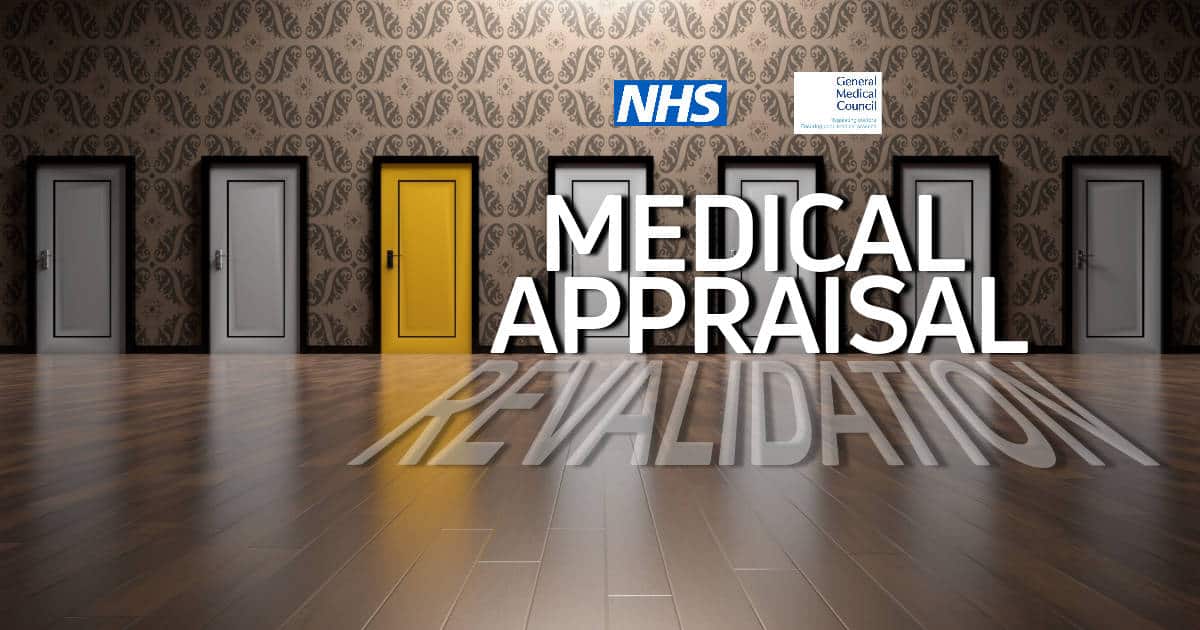Medical Appraisal and Revalidation in the UK

You may have gotten an email from your NHS Trust’s re-validation officer that you have an appraisal due soon and you’re worried just what that might entail. There’s no need for concern, it’s a fairly straightforward process. Also, you may have received a somewhat confusing e-mail from GMC talking about “Confirming a connection” with a designated body or “Give up your license” when you may have received your registration and license to practice a few months back but haven’t started working in the UK yet. Please continue to read on.
What is GMC Registration & License to practice?
As mentioned on the GMC’s official page here, there are 4 types of registration that are provided by the General Medical Council (UK).
Provisional Registration
This is the registration you may target for if you hadn’t completed any acceptable pattern of Internship anywhere following your graduation and looking forward to get into UKFPO foundation training.
Full Registration
This is the type of registration MOST of the International Medical Graduates (IMGs) apply for (who have completed an acceptable pattern of internship outside UK).
There are three ways you can apply for FULL registration. Read this article – How to get registered with GMC(UK).
Specialist Registration
To hold a substantive consultant post you need to have both FULL and Specialist registration. The ways to achieve this registration are discussed on GMC’s official page.
GP Registration
You can NOT work as a GP without getting registered as a GP by GMC. You can make the application after achieving the certificate of completion of training (CCT) for your GP training in the UK.
License to practice
This is different from the GMC registration. You don’t have to separately APPLY for it, it comes with your registration, but to continue to have that you need to keep up with a process of appraisal and revalidation.
“Doctors who practise medicine in the UK need to hold a licence to practise along with the suitable type of registration for the work that they do. It is the licence to practise which allows them to carry out certain activities such as prescribing medicines and treating patients.”General Medical Council (UK)
So, to keep up with your REGISTRATION – you have to pay the annual retention fee and fingers crossed not get involved in any legal action that can erase you. But, to keep up with your LICENSE TO PRACTICE – you need to take annual appraisal and five-yearly revalidation.
What is an appraisal?
Essentially it is a form of self-review where you reflect on all that you’ve done in the past year of your working in the UK (your scope of work, quality improvement, teaching, training, complaints, compliments, achievements, etc). You will also be asked to set goals that you wish to achieve before your next appraisal while working in the NHS. You will be aided by a senior colleague who will give you tips, advice, and basically guide you as needed. It happens usually every year.
There is a responsible officer in every designated body who is responsible for the doctor’s appraisal and re validation. If you are working in a non-training job, your TRUST is your designated body and when you are in a training job, your deanery is your designated body.
What is revalidation?
Revalidation is composed of 5 years of your appraisals. It’s the total process of keeping your license to practice updated. See the video or check out the GMC site here.
Is appraisal/revalidation an interview or a test?
That was my first fear working in the NHS when I heard that I have to go through an appraisal. It felt like I might be scrutinized for what professional development I did or I didn’t for the period of my work. But actually, it wasn’t. It was more like a conversation with my appraiser, a consultant, about what I have done and what I am going to do and that’s it.
How to get an appraisal done?
Most of the trusts have moved to online systems of the appraisal so the nitty-gritty may vary, but the overall idea and the process should be very similar. Our appraisal system was myL2P, we had to fill up the appraisal form online and upload the evidence and submit to the appraiser. The appraiser went through it and there was an appraisal meeting. After the appraisal meeting, we identified many things and I collected some more evidence and lastly it was submitted to the appraisal team of the trust.
Please remember that this process can vary from trust to trusts, because they may use a different system, but the idea stays similar. And, for a training job you get your appraisal done in your e-portfolio, not into a separate system like this.
Filling up the details in your appraisal form
This can The first few sections aren’t something you need to overthink; rather you need to just clearly outline what work you’ve been doing during the time period of your appraisal.
For example, in your scope of work while working in A&E:
- To perceive the nature of the problems presented by the patients and make appropriate decisions with the help of senior doctors.
- To communicate effectively with the patients, their relatives, with doctors and other healthcare providers.
- Clerking patients which involve history taking, performing necessary clinical examinations followed by necessary procedures.
CPDs
Next, if this is your first appraisal in the NHS, you can just mention that under reviews and record of annual appraisals. As for CPD (Continuing Professional Development), outline all the courses, teachings, and seminars you’ve attended within the duration of the appraisal that has garnered you CPD points. Make sure to mention what you did at these programs so that later when your appraiser goes over them with you they will have an idea of what you’ve accomplished.
You can earn 10 CPD points if you do an ALS course. Look here- Preparing for ALS course to know more about it.
Quality improvement projects
For Quality Improvement activity, mention all and any QIPs you’ve done. If you’ve not done any, it’s okay! It won’t be held against you. Again, ensure you fully explain what you’ve done and what your QIP was about in detail.
Read more here about how to go about doing a clinical audit and QIPs – Understanding Audits & QIPs.
Significant events
You’ll get an email from someone in your Trust beforehand if you’ve been mentioned in any significant events, but otherwise, you don’t need to worry about this section. The next part is great if you have any cards, notes, or letters from appreciative patients and their families, you can submit them here after making sure to black out any names or identifying information.
Achievements
The next part you really need to go in-depth about is your achievements. You don’t need to wrack your brain to pull out great accomplishments, rather you can start small by discussing how you reached to this pinnacle of working in the UK and then mention things you’d like to work towards in the future.
Additional information
Under additional information, talk about any other things you think are pertinent to your appraisal. This could be any mandatory training you’ve undergone or any activity you’ve done outside of the hospital that you think is worth mentioning. For the PDP proposal, make clear bullet point plans of what you wish to achieve by the next appraisal.
Pre-appraisal preparation
Lastly, the pre-appraisal preparation will have your reflect on different attributes listed. Briefly mention based on your experience and learning how you have developed certain skills and whatever you want to work to improve.
Frequently Asked Questions
I am still looking for job, and I got an email from GMC to choose a connection to a designated body. What should I do?
As discussed already, you can’t have a connection unless you have secured a job in the UK. So choosing “I don’t have a connection” is no problem at all, rather it is beneficial for you as your appraisal cycle is not starting (and should not start) unless you are working in the UK.
I obtained GMC registration with a License to practice (with APS restriction). What does that mean?
More often than not, all IMGs registering with GMC get that, so it’s not you. The Approved Practice Setting (APS) literally means that you have to work where there is an appraisal-revalidation process. Most of the NHS trusts are APS.
I don’t want to start working in the UK. What should I do?
It’s better to give up license and stay registered if you are not working in the UK. You can always get your license back when you get a job in the UK.
Can I fail my appraisal?
As it’s not a test, you technically can’t fail. But make sure you have put all the things that you did, in every possible detail in your appraisal so that it stays on the record. If your appraisal team is somehow is not satisfied you will have to cover your gap within an ultimatum or in the next appraisal cycle.
I would highly suggest making a physical portfolio as well where you just keep all your professional development related activities which will help you in the long run. Good luck!

